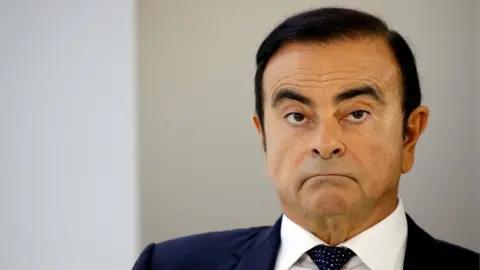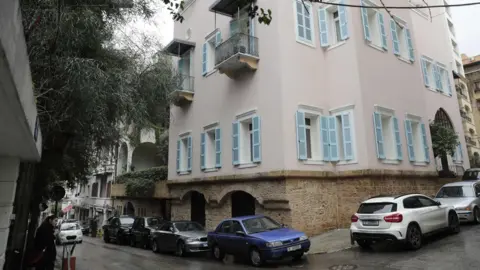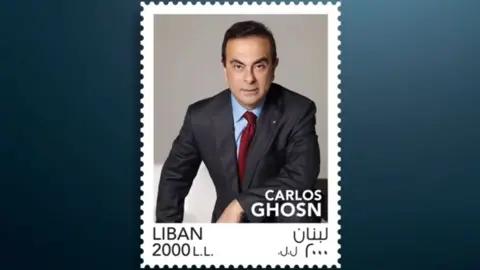Carlos Ghosn, Nissan's ex-head, flees Japan to Lebanon
 Reuters
ReutersFormer Nissan boss Carlos Ghosn has travelled to Lebanon after fleeing Japan, where he faces a trial over allegations of financial misconduct.
In a statement, Mr Ghosn said he had not fled justice but "escaped injustice and political persecution".
His lawyer said he was "dumbfounded" by the news and that he had not recently spoken with his client.
It is unclear how the former chief executive officer managed to leave, as he was barred from travelling abroad.
Mr Ghosn, who has an estimated net worth of $120m (£91m), was one of the most powerful figures in the global car industry until his arrest in November 2018. He denies any wrongdoing.
His case has attracted global attention and his months-long detention led to increased scrutiny of Japan's justice system.
The 65-year-old was born in Brazil to parents of Lebanese descent and was raised in Beirut, before travelling to France for further education. He holds French, Brazilian and Lebanese passports.
But his lawyer, Junichiro Hironaka, told reporters in Tokyo on Tuesday that Mr Ghosn's legal team was still in possession of his passports.
"I don't even know if we can contact him. I don't know how we will proceed beyond that," he said. Lebanon has no extradition agreement with Japan.
 AFP
AFPMr Ghosn was released on $9m bail in April under strict conditions that barred him from travelling abroad.
What did Carlos Ghosn's statement say?
Mr Ghosn released a short statement after multiple news agencies reported he had travelled to Lebanon.
Confirming he had gone to the Middle Eastern country, Mr Ghosn said he would "no longer be held hostage by a rigged Japanese justice system where guilt is presumed, discrimination is rampant, and basic human rights are denied.
"I have not fled justice - I have escaped injustice and political persecution. I can now finally communicate freely with the media, and look forward to starting next week."
Mr Ghosn has repeatedly denied any wrongdoing since he was first detained. His lawyers have accused the Japanese government of conspiring against him, calling the prosecution's case "politically motivated".
Mr Ghosn's wife, Carole, told the BBC in June that authorities had sought to "intimidate and humiliate" the couple.
How he could have left Japan remains unclear. There was video surveillance of his home and he had restricted phone and computer usage.
He had to surrender his passports to his lawyer, and had to ask for court permission to travel away from home for more than two nights.
According to Japan's Kyodo News agency, the terms of his bail remain unchanged. Immigration authorities hold no record of him leaving the country, public broadcaster NHK reports.

A celebrated figure in Lebanon
Analysis by Quentin Sommerville, BBC News, Beirut
There's no sign of Carlos Ghosn at his $14m dusty pink mansion in one of Beirut's most expensive neighbourhoods. The building, which is subject to a legal dispute, is empty.
But the former Nissan boss will have no trouble finding somewhere safe and luxurious to stay in Lebanon. Of Lebanese heritage, Mr Ghosn spent his early years here with family members. He's much celebrated and even appears on one of the country's postage stamps.
 LibanPost
LibanPostHe is also the co-founder of the IXSIR vineyard here, which boasts wines that are rich and "of remarkable elegance".
Escaping Japan would have been difficult given that his three passports were taken from him, but Lebanon has less than stringent border controls. Mr Ghosn is said to have arrived by private jet on Sunday evening and someone of his stature would have been able to breeze through immigration. When in town, he is often escorted by the security services.
He's been held in Japan for more than a year and in that time Lebanon has changed dramatically. Months of protests against corruption and the political elite have ousted the prime minister, and there's a full-blown economic crisis.
Japan gives millions in aid to Lebanon and will want Mr Ghosn returned. He may have successfully fled Japan, but he hasn't escaped his troubles.

What charges does Carlos Ghosn face?
Once considered a hero in Japan for turning around Nissan - even becoming the subject of a Japanese comic book - Mr Ghosn spent 108 days in custody after his arrest in Tokyo in November 2018.
Prosecutors allege that he made a multi-million-dollar payment to a Nissan distributor in Oman. Nissan, meanwhile, has filed its own criminal complaint against Mr Ghosn, accusing him of diverting money from the company for his own personal enrichment.
He is also accused of underreporting his own salary. Mr Ghosn denies all the charges.
Greg Kelly, a former Nissan executive who was arrested along with Mr Ghosn, is awaiting trial in Japan on financial misconduct charges. He denies conspiring with Mr Ghosn to falsify the former CEO's pay.
